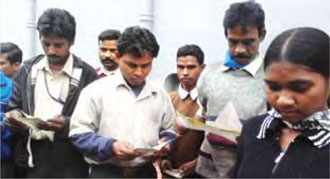| |
 |
Tata Steel respects and protects human rights both within and outside the workplace through the application of frameworks such as SA 8000 and the United Nations Global Compact based on the Universal Declaration of Human Rights and ILO conventions. Tata Steel's commitment to human rights is reflected in its Human Resource Policy, Procurement systems, Affirmative Action Policy and Social Strategy, all of which are aimed at fostering socio-economic empowerment through inclusive growth. Tata Steel's CSR and Accountability
Policy upholds applicable laws while dealing with stakeholders, avoiding any direct or indirect complicity in
the Infringement of fundamental rights.
|
Human rights in the workplace
Across its locations, Tata Steel provides equal opportunities to all its employees and all qualified
applicants for employment without regard to their race, caste, religion, colour, ancestry, marital status, sex, age, nationality and different ability status. To ensure diversity of its workforce, Tata Steel exercises positive discrimination in favour of socially disadvantaged communities provided potential employees fulfill its merit-based criteria. These systems and processes are monitored for compliance and subject to continuous improvement through the SA 8000 standard's independent third-party verification.
All employees of the Company have access to the Ethics Counsellor both directly and through a third party helpline. They are free to raise rights-based issues through forums for two-way communication, participative management and joint consultations. A special forum for women's empowerment has been created to address issues related to women and to support them as professionals.
To raise awareness, all recruits in Tata Steel must certify that they understand and accept the Tata Code of Conduct and are oriented to SA 8000, covering human rights issues.
The SA 8000 code of practice for companies comprises nine clauses:
| 1. |
Child Labour |
| 2. |
Forced and Compulsory Labour |
| 3. |
Health and Safety |
| 4. |
Freedom of Association and Right to Collective Bargaining |
| 5. |
Discrimination |
| 6. |
Disciplinary Practices |
| 7. |
Working Hours |
| 8. |
Remuneration |
| 9. |
Management Systems |
|
The Company has incorporated the clause on Child Labour in all its communication and reinforcement to
stakeholders. The policy states that no persons below the age of 18 years may be engaged by contractors, suppliers or vendors at any point, within or outside the Company premises, and in the event of discovery of such a case, liabilities for suitable remediation and ensuring well-being of the child would accrue to the defaulting party. |
Universalising Human Rights
A founder signatory to the United Nations Global Compact (UNGC), Tata Steel supports Principles One and Two of the UNGC, which are derived from the 1948 Universal Declaration of Human Rights (UDHR).
Tata Steel also promotes human rights widely through its policy of inclusive growth. Its sensitivity to encouraging a life of dignity extends to people living with HIV/AIDS through its HIV/AIDS policy and actions that flow from it.
The nine SA 8000 clauses and the UNGC Human Rights clauses are among the primary criteria for new vendor selection. Tier-2 service providers, i.e. sub-contractors of the Company's principal service providers, are provided registration only after they submit a declaration in support of the SA 8000. Engagement mechanisms such as vendor meets, training on SA 8000, surveys and continuing dialogues show the emphasis on human rights and social compliances.
To foster inclusive growth, the Company encourages local buying, particularly from small entrepreneurs and Non-Governmental Organisations (NGOs), whose revenue flows benefit the local and disadvantaged communities. In Financial Year 2011-12, the Company's purchases from those falling under the ambit of the Company's initiatives focussed on Affirmative Action amounted to  17 crores (US$3.6 million) and another 17 crores (US$3.6 million) and another  23 crores (US$4.8 million) of supplies was sourced from organisations with majority of the employees from AA communities. 23 crores (US$4.8 million) of supplies was sourced from organisations with majority of the employees from AA communities.
|
Securing rights of the disadvantaged and indigenous communities
Tata Steel continually revisits its social strategy to align it to the developmental needs of the disadvantaged and indigenous communities. Key elements of Tata Steel's social strategy include sustainable livelihoods, access to education and empowerment. The Company also seeks to promote tribal languages and culture to safeguard the unique identity of primitive and indigenous tribes.
Self Help Groups (SHGs) have been extremely successful in empowering and drawing its rural constituents, especially women, into the decision making process of their families. SHGs have also encouraged them to leverage their strengths when required for collective bargaining.
In 2011-12, Tata Steel increased the number of sponsorships for meritorious students from disadvantaged communities, specially from Scheduled Castes and Scheduled Tribes, by influencing their parents to allow students to attend mainstream residential schools. The cost of their education is borne by organisations
responsible for actualising the Company's social policies. Tata Steel also established a partnership with the
Government of Jharkhand in Financial Year 2011-12 to introduce a mid-day meal scheme for government schools
in Jamshedpur. In Financial Year 2011-12, the number of scholarships offered to students from Affirmative Action
communities increased almost three-fold to touch 1,956 children with an outlay of  7.5 million (US$0.16 million). 7.5 million (US$0.16 million).
|
 |
SUSTAINABILITY IN ACTION
|
|
A Center for International Private Enterprise (CIPE) and Social Accountability International (SAI) study concluded ".Tata Steel has significant potential to demonstrate the beneficial influence of adopting SA 8000 in India and beyond." Tata Steel introduced the SA 8000 assessment of vendors, which included labour, human rights and environmental aspects. |
 |
|
|
|
|